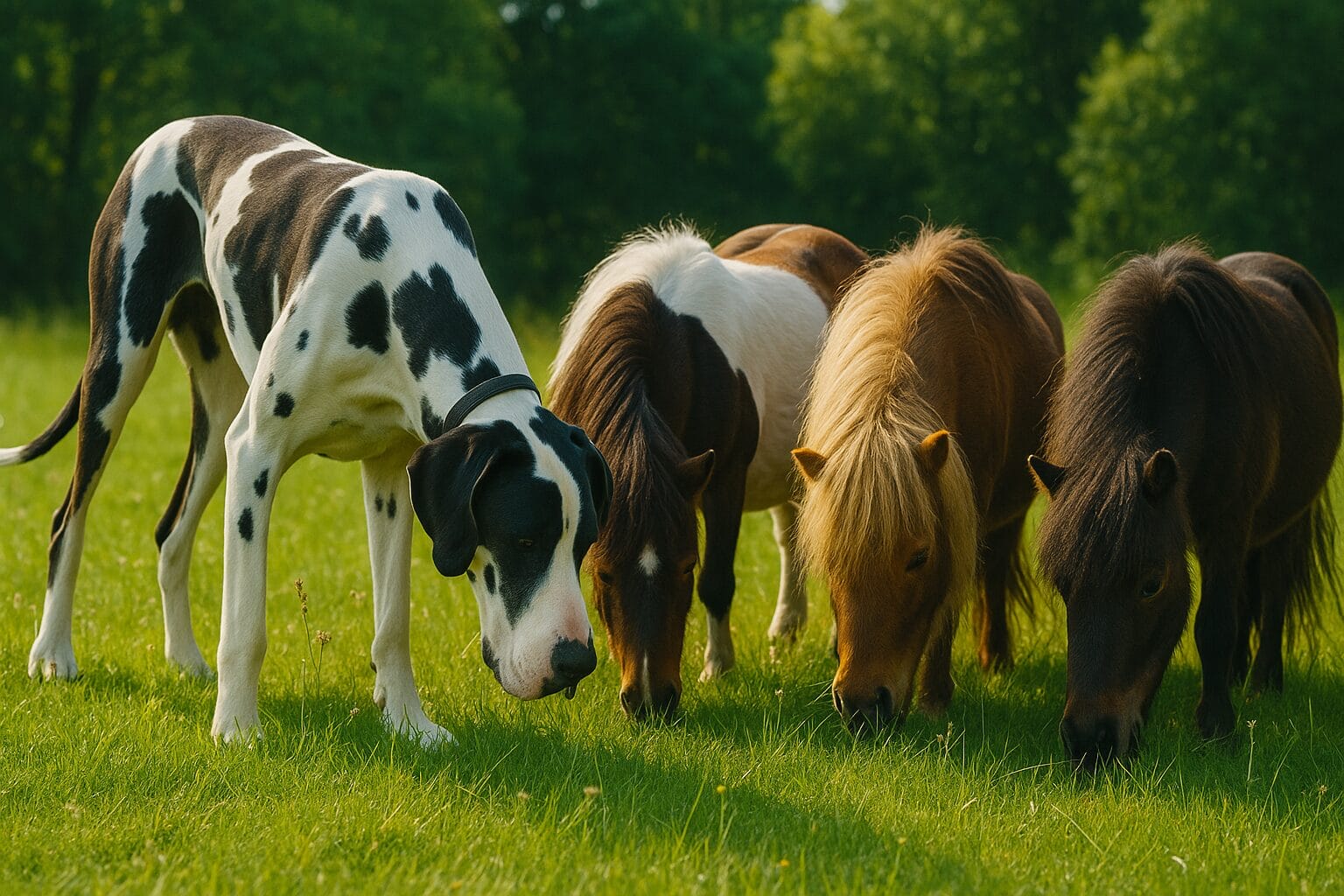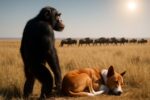A dog is a carnivore that, as a relative of the wolf, should eat grazing animals. Yet dogs also graze, and couch grass is desirable. In early spring, our horses were deeply offended when the terrier nibbled on the first sprouted green grass right under their noses.
The consumption of grass and hay by dogs is most often explained as either a dietary deficiency or a symptom of illness. The explanation always depends on the person explaining, and it never actually relates to the dogs themselves. It’s merely the owner’s opinion.
As with all peculiar behaviors in dogs, the real explanation is depressingly simple. However, people don’t like simple things, especially if the explanation increases uncertainty, and thus the wildest and most complex explanatory models are constructed.
Nevertheless, the reason for a dog’s grazing is unknown. Most dogs eat fresh grass without any apparent reason. It’s similar in nature to coprophagia—no one knows why feces appeal to dogs.
Eating grass is a prime example of a subject that is genuinely overthought despite being rather trivial and unknown. And when overthinking occurs, it leads to a situation where, on one hand, it is stated that dogs should not be given wheat because wolves do not graze in wheat fields, but on the other hand, it is suggested that dogs should be given grass or even wheatgrass because wild wolves also graze in hayfields.
Yes, that was a direct quote from a discussion claimed by the same person.
The Dog Knows
The pseudoscience world loves the assumption of an animal’s knowledge and understanding. Wild animals supposedly have some mystical knowledge of what they absolutely need and what is healthy for them.
We humans, on the other hand, have become disconnected from nature, so we don’t intuitively know the difference between a chanterelle and a fly agaric. However, we do know very precisely why animals do what they do.
Someone might even say there’s a tiny contradiction there—which is, of course, a given in the world of beliefs.
There are very few mechanisms in the body that trigger a need. Hunger itself is one, as is thirst. The mechanisms that create a need are primarily related to fluid balance and are controlled by the kidneys through electrolyte levels. The desire for salt is one such mechanism when there is a sodium deficiency.
The craving for salt is, however, quite limited in the animal kingdom and focuses on those that sweat through their skin. The most well-known are humans and horses, but moose and deer licking road salt are also too familiar to many. A dog never needs to steal salt because it never has a sodium deficiency—or if it does, it’s dying of thirst or has severely damaged kidneys.
On the other hand, a dog might easily have a potassium deficiency after exertion or when it has been panting (or barking) for a long time. Yet it doesn’t actively seek potassium from anywhere.
Overall, no deficiency drives eating or drinking anything, and the need for salt is actually a rare exception. An exception based on the kidneys’ role in regulating electrolytes.
The assumption that a dog knows what it needs also requires that the dog knows what it gets from each edible item. Nettles don’t have a different scent because of potassium or iron, and an anemic dog doesn’t actively try to eat nettles.
The most desperate explanation regarding nettles and anemia came from a nutritionist with a diploma from a pseudoscience course: the dog doesn’t eat nettles because it knows they contain oxalic acid and avoids it—the same diploma holder advised nettles elsewhere as an iron supplement.
Very often, you hear from experiential experts that when fiber is added to a dog’s diet, grazing stops. So, the dog somehow knows in a miraculous way that it has a fiber deficiency. However, no one has explained what the mechanism behind the desire for fiber is. Constipation or looseness isn’t such a mechanism because dogs generally never try to correct either condition. The owner tries.
What do you do when grazing doesn’t stop even after adding fiber? My dogs have received large amounts of alfalfa pellets, yet they still graze. Is the reason then the wrong kind of fiber?
The claim that adding fiber has stopped grazing is just an example of how things are linked together according to what one wants to observe. No dog grazes all the time. Even the length and age of the grass blade affect the matter. The dog might have been bored or had a brief stomach upset, both of which resolved regardless of what fiber the owner thought to give the dog.
I find it more concerning if a dog never eats fresh grass. Then one might even imagine that the dog feels so unwell all the time that it doesn’t dare eat anything extra. Or it habitually avoids the owner’s prohibition.
A dog knows no more than any other living creature and follows its cravings based on what is coded in its diet-related genes. And there certainly isn’t a chromosome pair instructing it to seek fiber from grass.
A Dog’s Sense of Smell Guides
A dog has a poor sense of taste. However, it has an extraordinarily good sense of smell. Smells strongly guide a dog’s life.
In spring, letters to the editor fill up with complaints about how dog droppings smell. Or there’s grumbling about spreading chicken manure in parks. The complaints arise from the unpleasant odor, which seems strongest in cities.
The smell isn’t the fault of lazy dog owners or the municipal gardening department. It comes from the decaying plant material from the previous fall, which begins to decompose when spring awakens bacterial activity and other decomposers. The smell of death is actually the smell of life as new soil is created.
Dogs often feel immense curiosity toward anything decaying. It’s part of their genetic heritage from scavenging times. That smell triggers a dog’s desire to eat soil.
The same mechanism presumably guides a dog to eat grass and hay. Fresh plants are generally sweet. Sugar itself doesn’t have much of a scent, but sugar compounds are linked to other aromas that give, for example, sweet fruits or flowers their characteristic sweet smell. Since we can smell it, the dog certainly can too.
Someone claimed to me that grass and hay don’t smell. To that, I can only say that they must have never mowed a lawn, never been present during haymaking, and never stood at the edge of a meadow after a spring rain.
Almost all living creatures have a coded desire for sugar. A dog is no exception. Sweetness triggers the desire to eat. That’s why a dog eats, for example, dandelion buds and foliage, raids berry bushes, and grazes—preferably on young vegetation.
The greed driven by sugar has nothing to do with imagined needs for flavonoids or even fiber by eating grass.
The Prey’s Stomach
Perhaps the oddest explanation in nutritional beliefs for a dog’s grazing is the claim that a dog needs grass because wolves eat the prey’s stomach. Firstly, wolves eat the stomach only from small prey animals because there’s so little to eat. From large prey animals, the rumen and intestines are consumed only if there’s a severe food shortage.
The stomach and intestines, along with the spine and large bones, are the things from which scavenger counts are made to estimate the wolf population size in the big world. Such counting is successful because wolves and other predators only eat these out of necessity.
The assumption about the stomach is peculiar. I find it difficult to see the logic in the idea that a pug eats fresh grass because something in its genes makes it dream of wolf times and eating the tops of half-digested seedlings from the stomach of a freshly felled moose. Or that a Lapland dog craves lichen from a reindeer’s stomach because wolves have hunted caribou and mammoths. This absurdity can be extended to me eating a salad plate because Scots cook haggis.
The same imagination includes claims that a dog eats grass because
- grass provides good bacteria
- grass provides lactic acid bacteria
- grass provides enzymes
Each claim is categorically wrong. There’s not even a hint of theoretical possibility for any of them.
Worm Expulsion Without Garlic
A fairly common claim is that a dog uses grass to expel worms. When roundworms are in the intestines or migrating larvae in the lungs cause coughing and vomiting, the dog has an innate need to eat grass.
Considering how quickly untreated dogs are ravaged by roundworms over several generations, one might even say that if such an assumption were true, evolution has made a terrible mistake in its experiments.
It’s strange that dogs don’t show much interest in garlic stalks. Usually, the same people who suggest couch grass and sedges for worm expulsion also consider garlic an absolutely effective way to expel all parasites from worms to ticks.
Apparently, dogs don’t naturally know everything… or maybe they know more than their owners.
Undigested grass reveals roundworm spaghetti in severe infestations. The same effect occurs with any undigested food, including diarrhea. It’s an effect caused by mechanical irritation, which doesn’t actually expel anything, even if some appear. Roundworms would otherwise appear, but no one seriously suggests that eating and defecating is an internal parasite expulsion.
In the same category is the more common belief in some cleansing effect of grass on the intestines or body. It’s imagined that something harmful gets stuck in some intestinal bend, which is then tried to be removed.
This might come as a shock to some, but the food a dog eats first turns into a mushy digestive mass, and as it travels through the intestines, the digestible part is absorbed for the body’s use, and finally, a lot of bacterial mass from the intestinal lining, both live and dead, is included, which is then excreted last.
Excretion is the body’s cleansing act of completely natural material, and the resulting feces are also completely natural. There’s no cleansing factor, no matter how much the owner believes in detox fantasies or practices enemas.
The idea that the intestines need some bottle brush to clean the pipes is far from natural. Grass digests poorly and is actually a foreign object. Every dog owner has at some point pulled grass from a dog’s rear and knows it doesn’t feel pleasant for the dog. In the worst case, the leaves can cause paper cuts not only to the owner’s fingers but also to the dog’s intestines or anus. No, it’s not healthy, although it rarely causes any real problems.
Natural Treatment for Heartburn
By far the most commonly stated claim is that eating grass is a sign of some stomach or intestinal symptom. When there are enough diplomas in dog nutrition, the diagnosis is made based on whether the dog vomits or not. If it doesn’t vomit, the dog has eaten grass to get fiber, vitamins, and enzymes. If it vomits, the dog has heartburn, intestinal inflammation, or internal organ diseases.
That might be everyday life if the dog’s bodily functions are assessed through aromatherapy means. And no, that wasn’t even a joke, but a regrettable everyday reality.
A dog vomits whenever it has eaten too much indigestible material. It has nothing to do with diseases or the biologically contrary assumptions of living food enzymes. If a dog vomits a pile of grass it has gobbled, it’s certainly not a reason to rush to the vet. Conversely, if the dog has other more serious symptoms, it’s worth going to the vet, even if the dog hasn’t vomited.
Grazing itself doesn’t indicate anything. However, from how a dog eats grass, one can make some guesses. Even then, the guess must be made in conjunction with other symptoms, and if there are no other problems, grazing doesn’t indicate anything about health or illness.
If a dog’s grazing is manic, compulsive, it’s often associated with digestive issues, usually in the stomach. Heartburn is one explanation. But it’s important to understand that in such cases, the dog tries to eat anything.
Grass is grazed simply because it’s easily available. It’s not eaten because it’s grass. The same symptom picture includes excessive drinking or licking surfaces.
If the owner hasn’t previously noticed the dog’s discomfort, then grazing is the owner’s wake-up call, but it still doesn’t make grazing somehow necessary or beneficial.
If your dog has heartburn, don’t take it to a hayfield. Book help!
Should Grazing Be Addressed?
There’s no need to address normal recreational grazing. Of course, it should be somewhat limited because indigestible grass, despite all the hype, isn’t healthily sensible in the stomach and intestines. Rarely does grass cause real problems—though I know a couple (retrievers, is that a surprise) who have ended up with intestinal blockage from grass.
If a dog’s eating is manic, compulsive, it should be addressed, and an attempt should be made to figure out what’s wrong. Even exaggeratedly enthusiastic grazing isn’t seriously harmful, but it can develop into obsessive-compulsive behavior, even if there isn’t any underlying physical issue.
And no, the problem isn’t always in the stomach and intestines. The reason might be found in more psychological substitute behavior: stress, fear, total boredom.
You can add fiber to a dog’s diet if it helps you sleep better at night. And sometimes fiber does help with certain stomach and intestinal issues, the most visible symptom of which is grazing, and in that case, the situation calms down. But it’s important to understand that the reason wasn’t fiber or its lack, but fiber was used as supportive treatment, a band-aid. Often, changing the food also helps.
Occasionally, dry foods are blamed for grazing, and it’s mentioned how meat improved the situation. Yes, meat improved something, and usually, the reason is found in, for example, heartburn. But then the benefit wasn’t gained from any mystical naturalness or rawness, but from the change in food.
Maniacs have also been cured by switching them from meat to dry food, but those cases completely bypass the natural raw advocates. In those cases, it was the same issue, switching unsuitable food that made the dog sick to something else.
In Conclusion: The Reason for a Dog’s Grass Eating
A dog eats grass for three basic reasons:
- grass tastes good
- grazing grass seems like a good idea to the dog
- eating grass is a symptom of something
Ultimately, it’s all just guessing, and as long as dogs don’t tell us why one grass tastes better than another variety, we don’t know the reason.
Still, grazing doesn’t make the predator an omnivore.





